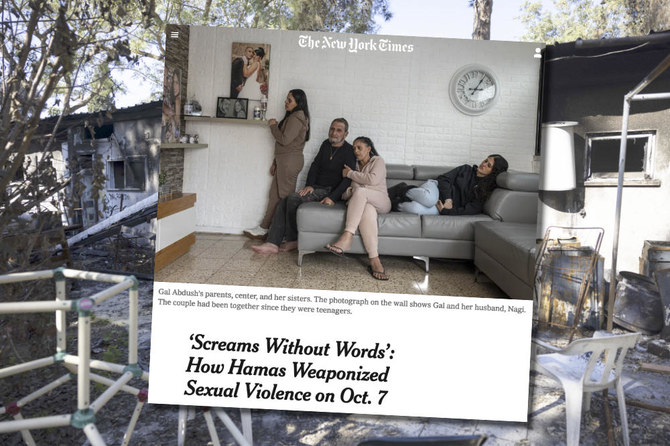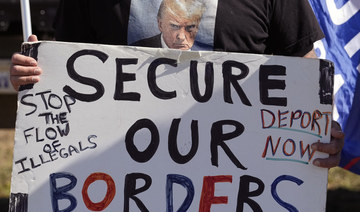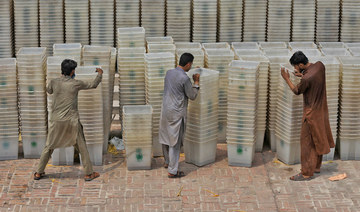RABAT, Morocco: Moroccan authorities have sentenced a Youtuber who criticized the king to prison, and detained a journalist-activist who defended anti-government protesters in a tweet.
Freedom of speech advocates say the moves Thursday reflect growing pressure against those who use social networks to express anger at economic and social problems.
A court in Settat handed a four-year prison sentence to Mohammed Bekkaki for referring to Moroccans as donkeys and criticizing King Mohammed VI, in a video posted on YouTube in November. The royal family is widely revered in Morocco, and criticizing the king is a criminal offense.
Also Thursday, journalist and activist Omar Radi was detained in Casablanca and charged with insulting a judge. Radi’s arrest was prompted by a tweet six months ago criticizing a Moroccan court’s decision to hand maximum prison sentences to leaders of mass demonstrations in the poverty-stricken northern Rif region.
The Casablanca court refused to grant Radi bail pending the next hearing Jan. 2, said activist Khalid El Bekkari, who was in the court when Radi was charged. If convicted, Radi could face up to a year in prison and a €500 ($555) fine. It was unclear why the arrest occurred so long after the original tweet.
Radi was also part of Arab Spring protests in Morocco in 2011 that pushed against corruption and abuse of power and limits on free speech, and he has continued to defend human rights since then.
Morocco, long known for its stability in the Arab world, adopted constitutional reforms in response to the Arab Spring, but the country is still struggling with poverty, corruption and unemployment.
Freedom of expression is guaranteed in the Moroccan constitution, but with limits. Authorities say some social media users are pushing those limits too far, sometimes for personal gain.
But rights activists say authorities are trying to cover up their inability to solve Morocco’s problems.
“There is a strong escalation against freedom of expression by authorities, shown by the successive arrests and trials of bloggers and social media users to express their anger over the deteriorating social and economic conditions,” the Moroccan Freedom Now association said in a statement after Radi’s arrest.
Last month a rapper known as Gnawi went on trial over a video in which he insulted the police. His supporters viewed his arrest as punishment for another, hugely popular YouTube video that rages against Moroccan powers-that-be and criticizes the country’s widening economic gap.
Moroccan YouTuber sentenced to prison, journalist detained
https://arab.news/ceyrg
Moroccan YouTuber sentenced to prison, journalist detained

- A court in Settat handed a four-year prison sentence to Mohammed Bekkaki for referring to Moroccans as donkeys
- Journalist and activist Omar Radi was detained in Casablanca and charged with insulting a judge
Violence against environmental journalists rises: Report

- State actors repsonsible for the attacks in most cases, says UNESCO
More than 70 percent of the 905 journalists the agency surveyed in 129 countries said they had been attacked, threatened or pressured, and that the violence against them had worsened — with 305 attacks reported in the last five years alone.
UNESCO, the UN cultural agency, listed in its report physical attacks such as injuries, arrests and harassment, as well as legal actions, including defamation lawsuits and criminal proceedings, among others.
At least 749 journalists, groups of journalists and media outlets have been attacked in 89 countries across all regions, its report said, with state actors being responsible for at least half and private for at least a quarter.
“State actors — police, military forces, government officials and employees, local authorities — are responsible for most of the attacks for which perpetrator information is available,” the report said.
These journalists were covering a wide range of topics, including protests, mining and land conflicts, logging and deforestation, extreme weather events, pollution and environmental damage, and the fossil fuel industry.
Men were more frequently attacked in general and women more frequently digitally, the report said.
Of the 44 journalists that were murdered in 15 countries while reporting on environmental issues, the report said only five cases resulted in convictions. Perpetrators remain unidentified in 19 of the 44 murders.
At least 24 journalists survived murder attempts.
UNESCO awards press prize to Palestinian journalists in Gaza

- UN director says prize is tribute to their courage
PARIS: UNESCO on Thursday awarded its world press freedom prize to all Palestinian journalists covering the war in Gaza, where Israel has been battling Hamas for more than six months.
“In these times of darkness and hopelessness, we wish to share a strong message of solidarity and recognition to those Palestinian journalists who are covering this crisis in such dramatic circumstances,” said Mauricio Weibel, chair of the international jury of media professionals.
“As humanity, we have a huge debt to their courage and commitment to freedom of expression.”
Audrey Azoulay, director general at the UN organization for education, science and culture, said the prize paid “tribute to the courage of journalists facing difficult and dangerous circumstances.”
According to the New York-based Committee to Protect Journalists (CPJ), at least 97 members of the press have been killed since the war broke out in October, 92 of whom were Palestinians.
The war started with Hamas’s unprecedented October 7 attack on Israel that resulted in the deaths of 1,170 people, mostly civilians, according to an AFP tally of Israeli official figures.
Israel estimates that 129 captives seized by militants during their attack remain in Gaza. The military says 34 of them are dead.
Israel’s retaliatory offensive against Hamas has killed at least 34,596 people in Gaza, mostly women and children, according to the Hamas-run territory’s health ministry.
Russian state media is posting more on TikTok ahead of the US presidential election, study says

- State-linked accounts are also active on other social media platforms and have a larger presence on Telegram and X than on TikTok, says Brookings Institution report
- The report comes after Biden last month signed legislation forcing TikTok’s parent company — China-based ByteDance — to sell the platform or face a ban in the US
Russian state-affiliated accounts have boosted their use of TikTok and are getting more engagement on the short-form video platform ahead of the US presidential election, according to a study published Thursday by the nonprofit Brookings Institution.
The report states that Russia is increasingly leveraging TikTok to disseminate Kremlin messages in both English and Spanish, with state-linked accounts posting far more frequently on the platform than they did two years ago.
Such accounts are also active on other social media platforms and have a larger presence on Telegram and X than on TikTok. However, the report says user engagement — such as likes, views and shares — on their posts has been much higher on TikTok than on either Telegram or X.
“The use of TikTok highlights a growing, but still not fully realized, avenue for Russia’s state-backed information apparatus to reach new, young audiences,” reads the report, which drew data from 70 different state-affiliated accounts and was authored by Valerie Wirtschafter, a Brookings fellow in foreign policy and its artificial intelligence initiative.
The study notes that most posts do not focus on US politics but other issues, like the war in Ukraine and NATO. However, those that do tend to feature more divisive topics like US policy on Israel and Russia, and questions around President Joe Biden’s age, the Brookings report says.
A TikTok spokesperson said the company has removed covert influence operations in the past and eliminated accounts, including 13 networks operating from Russia.
The spokesperson said TikTok also labels state-controlled media accounts and will expand that policy in the coming weeks “to further address accounts that attempt to reach communities outside their home country on current global events and affairs.”
The Brookings report comes after Biden last month signed legislation forcing TikTok’s parent company — China-based ByteDance — to sell the platform or face a ban in the US. The potential ban is expected to face legal challenges.
US media experts demand review of New York Times story on sexual violence by Hamas on Oct. 7

- 64 American journalism professionals sign letter accusing the newspaper of failing to do enough to investigate and confirm the evidence supporting the allegations in its story
- It concerns a story headlined ‘Screams Without Words: Sexual Violence on Oct. 7’ that ran on the front page of the newspaper on Dec. 28
CHICAGO: Sixty-four American journalism professionals signed a letter sent to New York Times bosses expressing concern about a story published by the newspaper that accused Palestinians of sexual violence against Israeli civilians during the Oct. 7 attacks.
It concerns a story headlined “Screams Without Words: Sexual Violence on Oct. 7” that ran on the front page of the newspaper on Dec. 28 last year.
In the letter, addressed to Arthur G. Sulzberger, chairperson of The New York Times Co., and copied to executive editors Joseph Kahn and Philip Pan, the journalism professionals, who included Christians, Muslims and Jews, demanded an “external review” of the story.
It is one of several news reports by various media organizations that have been used by the Israeli government to counter criticisms of the brutal nature of its near-seven-month military response to the Hamas attacks, during which more than 34,000 Palestinians have been killed and most of the homes, businesses, schools, mosques, churches and hospitals in Gaza have been destroyed, displacing more than a million people, many of whom now face famine.
The letter, a copy of which was obtained by Arab News, states that “The Times’ editorial leadership … remains silent on important and troubling questions raised about its reporting and editorial processes.”
It continues: “We believe this inaction is not only harming The Times itself, it also actively endangers journalists, including American reporters working in conflict zones, as well as Palestinian journalists (of which, the Committee to Protect Journalists reports, around 100 have been killed in this conflict so far).”
Shahan Mufti, a journalism professor at the University of Richmond, a former war correspondent and one of the organizers of the letter, told Arab News that The New York Times failed to do enough to investigate and confirm the evidence supporting the allegations in its story.
“The problem is the New York Times is no longer responding to criticism and is no longer admitting when it is making mistakes,” he said. The newspaper is one of most influential publications in the US, he noted, and its stories are republished by smaller newspapers across the country.
This week, the Israeli government released a documentary, produced by pro-Israel activist Sheryl Sandberg, called “Screams Before Silence,” which it said “reveals the horrendous sexual violence inflicted by Hamas on Oct. 7.” It includes interviews with “survivors from the Nova Festival and Israeli communities, sharing their harrowing stories” and “never-before-heard eyewitness accounts from released hostages, survivors and first responders.”
In promotional materials distributed by Israeli consulates in the US, the producers of the documentary said: “During the attacks at the Nova Music Festival and other Israeli towns, women and girls suffered rape, assault and mutilation. Released hostages have revealed that Israeli captives in Gaza have also been sexually assaulted.”
Critics have accused mainstream media organizations of repeating unverified allegations made by the Israeli government and pro-Israel activists about sexual violence on Oct. 7, with some alleging it is a deliberate attempt to fuel anti-Palestinian sentiment in the US and help justify Israel’s military response.
Some suggest such stories have empowered police and security officials in several parts of the US to crack down on pro-Palestinian demonstrations, denouncing the protesters as “antisemitic” even though some of them are Jewish.
New York Mayor Eric Adams, for example, asserted, without offering evidence, that recent protests by students on college campuses against the war in Gaza had been “orchestrated” by “outside agitators.”
Israeli Prime Minister Benjamin Netanyahu has said the protests against his country’s military campaign in Gaza are antisemitic in nature.
Jeff Cohen, a retired associate professor of journalism at Roy H. Park School of Communications at Ithaca College, told Arab News The New York Times story was “flawed” but has had “a major impact in generating support for Israeli vengeance” in Gaza.
He continued: “Israeli vengeance has claimed the lives of tens of thousands of civilians. That’s why so many professors of journalism and media are calling for an independent investigation of what went wrong.
“That (New York Times) story, along with other dubious or exaggerated news reports — such as the fable about Hamas ‘beheading babies’ that President Biden promoted — have inflamed war fever.”
Cohen said the US media “too often … have promoted fables aimed at inflaming war fever,” citing as an example reports in 1990 that Iraqi soldiers had removed babies from incubators after their invasion of Kuwait. The assertions helped frame anti-Iraqi public opinion but years later they were proved to be “a hoax,” he added.
“On Oct. 7, Hamas committed horrible atrocities against civilians and it is still holding civilian hostages,” Cohen said. “Journalists must tell the truth about that, without minimizing or exaggerating, as they must tell the truth about the far more horrible Israeli crimes against Palestinian civilians.
“The problem is that the mainstream US news media have a long-standing pro-Israel bias. That bias has been proven in study after study. Further proof came from a recently leaked New York Times internal memo of words that its reporters were instructed to avoid — words like ‘Palestine’ (‘except in very rare cases’), ‘occupied territories’ (say ‘Gaza, the West Bank, etc.’) and ‘refugee camps’ (‘refer to them as neighborhoods, or areas’).”
Mufti, the University of Richmond journalism professor, said belligerents “on both sides” are trying to spin and spread their messages. But he accused Israeli authorities in particular of manipulating and censoring media coverage, including through the targeted killing of independent journalists, among them Palestinians and Arabs, and said this was having the greatest impact among the American public.
“Broadly speaking, a lot of the Western news media, and most of the world news media, do not have access to the reality in Gaza,” he said. “They don’t know. It is all guesswork.
“They are all reporting from Tel Aviv, they are reporting from Hebron, they are reporting from the West Bank. Nobody actually knows what the war looks like. It is all secondhand information.
“Most of the information is coming through the Israeli authorities, government and military. So, of course, the information that is coming out about this war is all filtered through the lens of Israel, and the military and the government.”
Mufti said the story published by The New York Times “probably changed the course, or at least influenced the course, of the war.”
He said it appeared at a time when US President Joe Biden was pushing to end the Israeli military campaign in Gaza “and it entirely changed the conversation. It was a very consequential story. And it so happens it was rushed out and it had holes in it … and it changed the course of the war.”
Mohammed Bazzi, an associate professor with the Arthur L. Carter Journalism Institute at New York University, told Arab News the letter demanding an “external review” of the story is “a simple ask.”
He added: “This story, and others as well, did play a role” in allowing the Israeli military to take action beyond acceptable military practices “and dehumanize Palestinians.” Such dehumanization was on display before Oct. 7, Bazzi said.
“In the Western media there seemed to be far less sympathetic coverage of Palestinians in Israel’s war in Gaza as a consequence of these stories,” he continued.
“We have seen much less profiles of Palestinians … we are beyond 34,000 Palestinians killed but we don’t have a true number or the true scale of the destruction in Gaza — there could be thousands more dead under the rubble and thousands more who will die through famine and malnutrition. This will not stop, as a consequence of what Israel has done.”
Bazzi said the Western media has contributed to the dehumanization of Palestinians more than any other section of the international media, while at the same time humanizing the Israeli victims.
“The New York Times has a great influence on the US media as a whole and sets a standard” for stories and narratives that other media follow, which is “more pro-Israel and less sympathetic to Palestinians,” he added.
Bazzi, among others, said The New York Times has addressed “only a handful of many questions” about its story and needs to do more to present a more accurate account of what happened on Oct. 7.
The letter to New York Times bosses states: “Some of the most troubling questions hovering over the (Dec. 28) story relate to the freelancers who reported a great deal of it, especially Anat Schwartz, who appears to have had no prior daily news-reporting experience before her bylines in The Times.”
Schwartz is described as an Israeli “filmmaker and former air force intelligence official.”
Adam Sella, another apparently inexperienced freelancer who shared the byline on the story, is reportedly the nephew of Schwartz’s partner. The only New York Times staff reporter with a byline on the story was Jeffrey Gettleman.
Media scrutiny of the story revealed that “Schwartz and Sella did the vast majority of the ground reporting, while Gettleman focused on the framing and writing,” according to the letter.
The New York Times did not immediately respond to requests by Arab News for comment.
Creative tech agency Engage Works to launch in Saudi Arabia

- Representation at the Saudi Entertainment and Amusement Expo 2024
DUBAI: Creative technology agency Engage Works has announced its expansion into Saudi Arabia with the acquisition of a new trade license in the Kingdom.
Steve Blyth, founder and group CEO of the agency, told Arab News: “Saudi Arabia feels like the center of the universe right now for the creation of cultural destinations and immersive experiences.
“We get to work on projects that probably wouldn’t happen anywhere else in the world right now. The wealth of untapped cultural assets the Kingdom wants to bring to life — for new, young and international audiences — is unsurpassed.”
The agency will be represented at the Saudi Entertainment and Amusement Expo 2024, which takes place at the Riyadh Front Exhibition and Conference Center from May 7-9.
Alex McCuaig, Engage Work’s strategy director, said: “This is a great opportunity for us to showcase our expertise in creating immersive experiences and to collaborate with other industry leaders to drive innovation and engagement in the region.”
The agency has already won several projects in the Kingdom and will be opening an office in the country in the coming months, he added.
Engage Works currently has premises in London and Dubai, and its clients include Emirates, Accenture, Google, KPMG, Microsoft, and EY.


















